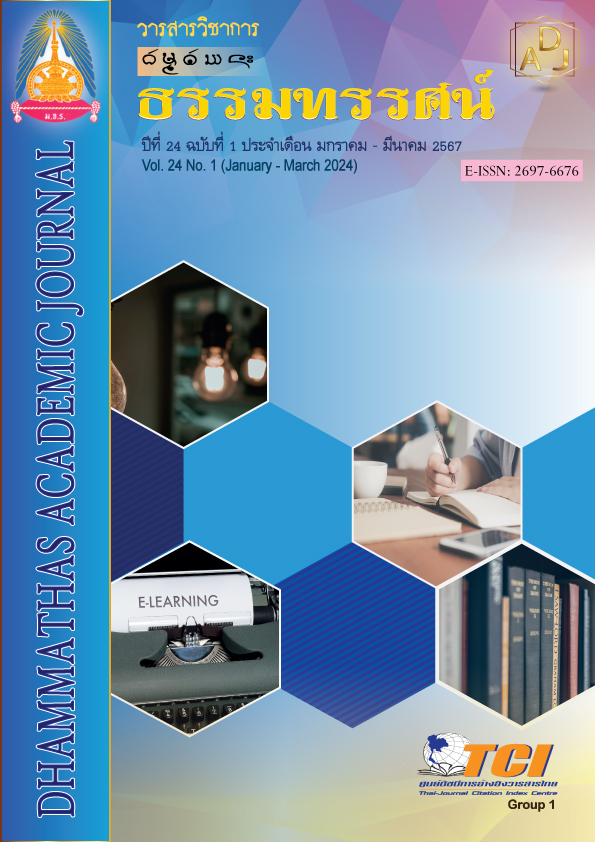The Development of Scientific literacy in a Daily life through flipped classroom and Team-based Learning management for Undergraduates at North Eastern University
Main Article Content
Abstract
The purpose of this research was to develop the scientific literacy in a daily life through flipped classroom and Team-based Learning for undergraduates at North Eastern University to learn in science in daily life subject. Research samples were 30 undergraduates obtained from purposive sampling who register to study in science in a daily life in the 2nd semester of academic year 2022 in total of 56 undergraduates. The research design was one -group pretest- posttest design. The research tools used in this research including; 1) the flipped classroom and Team Base Learning lesson plan and 2) scientific literacy in a daily life test the statistics for testing was t-test Dependent.
The result found that: undergraduates who through a flipped classroom and Team Base Learning management got scientific literacy in a daily life showed the higher mean scores of the student post-tests with statistical significance of 0.05.
Article Details

This work is licensed under a Creative Commons Attribution-NonCommercial-NoDerivatives 4.0 International License.
เพื่อให้เป็นไปตามกฎหมายลิขสิทธิ์ ผู้นิพนธ์ทุกท่านต้องลงลายมือชื่อในแบบฟอร์มใบมอบลิขสิทธิ์บทความ ให้แก่วารสารฯ พร้อมกับบทความต้นฉบับที่ได้แก้ไขครั้งสุดท้าย นอกจากนี้ ผู้นิพนธ์ทุกท่านต้องยืนยันว่าบทความ ต้นฉบับที่ส่งมาตีพิมพ์นั้น ได้ส่งมาตีพิมพ์เฉพาะในวารสาร วิชาการธรรม ทรรศน์ เพียงแห่งเดียวเท่านั้น หากมีการใช้ ภาพหรือตารางของผู้นิพนธ์อื่นที่ปรากฏในสิ่งตีพิมพ์อื่นมาแล้ว ผู้นิพนธ์ต้องขออนุญาตเจ้าของลิขสิทธิ์ก่อน พร้อมทั้ง แสดงหนังสือที่ได้รับการยินยอมต่อบรรณาธิการ ก่อนที่บทความจะได้รับการตีพิมพ์References
กระทรวงศึกษาธิการ. (2563). แนวทางการวัดและประเมินผลในชั้นเรียนกลุ่มสาระการเรียนรู้วิทยาศาสตร์ตามหลักสูตรการศึกษาขั้นพื้นฐานพุทธศักราช 2544. กรุงเทพฯ: คุรุสภาลาดพร้าว.
ปฏิญญา จันทร์เพ็ญ และภัทรพรรณ พรหมคช. (2566). การจัดการเรียนการสอนภาษาอังกฤษตามแนวคิดห้องเรียนกลับด้าน. Journal of Education Studies, 1(1), 1-11.
พงษ์ลัดดา ปัญญาจิรวุฒิ และวันวิสาห์ ปัญญาจิรวุฒิ. (2566). การศึกษาผลการจัดการเรียนรู้แบบห้องเรียนกลับด้านที่มีต่อผลสัมฤทธิ์ทางการเรียน รายวิชาฟิสิกส์ร่วมสมัย. วารสารศึกษาศาสตร์ มหาวิทยาลัยศิลปากร, 21(1), 204-221.
วิชชุญา กันบุรมย์ และแสงสุรีย์ ดวงคำน้อย. (2566). การพัฒนาความสามารถการคิดอย่างมีวิจารณญาณและทักษะกระบวนการทาง วิทยาศาสตร์โดยการจัดการเรียนรูแบบผสมผสานการสืบเสาะหาความรู้ 7E ร่วมกับเทคโนโลยีดิจิทัลสำหรับนักเรียนชั้นมัธยมศึกษาปีที่ 3. วารสารวิชาการและวิจัย มหาวิทยาลัยภาคตะวันออกเฉียงเหนือ, 13(3), 60-67.
สาอาดะฮ์ หมุนนุ้ย และน้ำเพชร นาสารีย์. (2566). การศึกษาผลการใช้การจัดการเรียนรู้แบบสืบเสาะหาความรู้ (5E) ร่วมกับการใช้เกมกระดาน เรื่อง ดาวในระบบสุริยะเพื่อส่งเสริมสมรรถนะการอธิบายปรากฏการณ์เชิงวิทยาศาสตร์ของนักเรียนชั้นประถมศึกษาปีที่ 4. วารสารวิชาการและวิจัย มหาวิทยาลัยภาคตะวันออกเฉียงเหนือ, 13(3), 1-15.
Alqahtani, T. M., Yusop, F. D. & Halil, S. H. (2023). Content validity of the Constructivist Learning in Higher Education Settings (CLHES) scale in the context of the flipped classroom in higher education. Human & Social Sciences Communication, 1-12.
Bae, J., et al. (2023). Predicting grade school scientific literacy from aspects of the early home science environment. Frontiers Psychology, 1-14.
Budiarti, I. S., & Tanta, T. (2021). Analysis on students’ scientific literacy of newton’s law and motion system in living things. Journal Pendidikan Sains Indonesia, 9(1), 36-51.
Burgess, A., et al. (2017). Team-based learning (TBL) in the medical curriculum: better than PBL?. BMC Medical Education, 17(1), 243.
Eichler, J. F., & Peeples, J. (2016). Flipped classroom modules for large enrollment general chemistry courses: a low barrier approach to increase active learning and improve student grades. Chem Educ Res Pract, 17(1), 197-208.
Holbrook, J. (2010). Education through science as a motivational innovation for science education for all. Science Education International, 21(2), 80-91.
Oktalia, Y., Susila, A. B., & Iswanto, B. H. (2021). Virtual test instruments to measure scientific literacy of high school students on work and energy. Journal of Physics: Conference Series, 2019(1), 1-8.
Primasari, R., Miarsyah, M. & Rusdi, R. (2020). Science literacy, critical thinking skill, and motivation: A correlational study. Jurnal Pendidikan Biologi Indonesia, 6(2), 273-280.
Reimschisel, T., et al. (2017). A systematic review of the published literature on team-based learning in health professions education. Med Teach, 39(12), 1227-1237.
Wijayanto, N., et al. (2023). The effectiveness of flipped classroom on scientific literacy and critical thinking improvement. Jurnal Pendidikan Kimia (JPKim), 15(2), 119-129.

